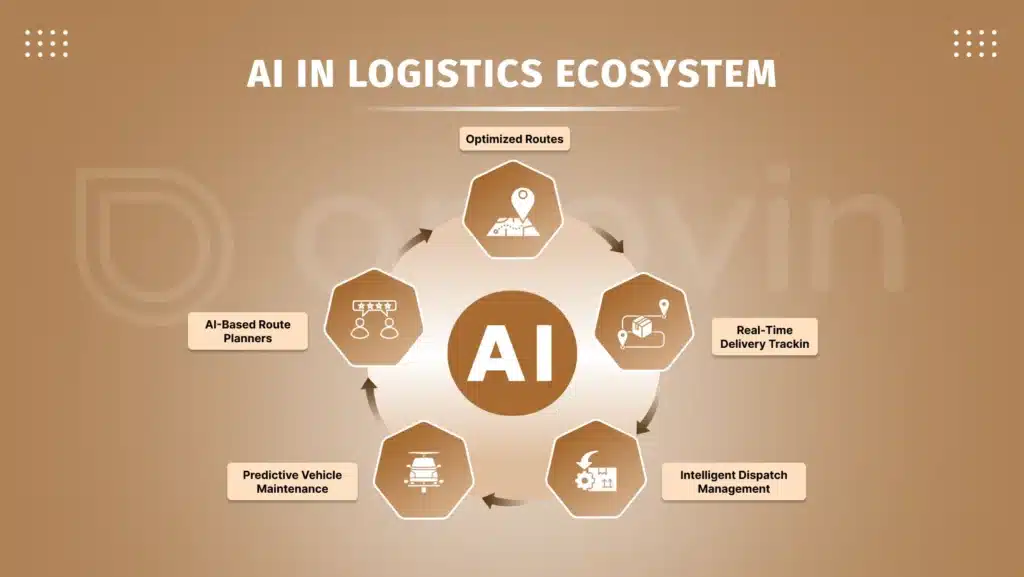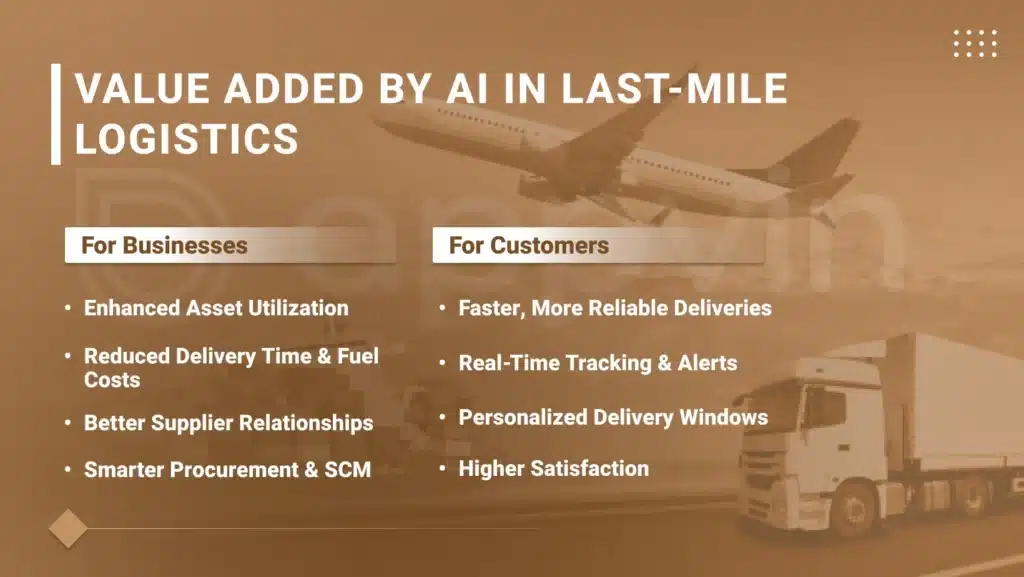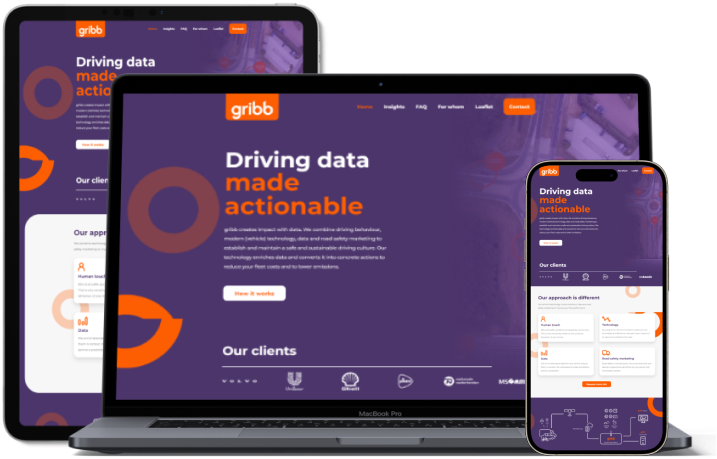AI is reshaping last mile delivery with logistics becoming intelligent, routing becoming quicker, and monitoring becoming real-time. As promised, volumes are on the rise, AI makes the companies leaner, reduces delays, and delights customers. From predictive analytics and best-routing applications to cold chain tracking and intelligent dispatching, AI-based software is enabling operations to become quicker and superior in the retail, healthcare, and e-commerce space. Customers are experiencing more precise delivery times, smoother options, and greater openness. It’s a business advantage in the fast supply chain age.
The Expanding Role of AI in Delivery Logistics
While mounting customer requirements and expanding logistics networks subject supply chains to further pressure to move faster, more accurately, and as inexpensively as possible, the last-mile process, whose final step is to move a product from the final hub to the consumer, is still the most vital component of the entire operation today.
Artificial intelligence is helping businesses increase delivery speed and reliability, besides customer satisfaction.
On this blog, we discuss how AI solutions are revising last mile delivery in different sectors.
What Last Mile Delivery Is
Last mile delivery is the final mile of a product’s journey-from a warehouse to a consumer’s front door. It’s typically the most labor- and cost-intensive stage of the supply chain in Mobility App Development.
Some of the most critical challenges are:
- Excess delivery cost
- Traffic congestion and delay
- Delivery timetable delays
- Inefficient routing systems
AI Streamlines the Last Delivery Phase
AI last mile delivery is revolutionizing logistics staff planning, execution, and delivery management. AI-powered real-time supply chain analytics, forecasting models, and real-time insights enable businesses to forecast demand and prevent disruption.
The most important capabilities are:
- Traffic and delivery demand forecasting
- Dynamic re-routing through real-time information
- Cold chain logistics tracking for perishables
- Effective supply chain risk management functions
AI Applications in Real-Life Modern Logistics

AI is no new thing, and yet it is already making an assessable impact with some of its logistics innovations:
Optimized Routes
Route-optimizing software by AI determines the optimal routes based on monitoring real-time traffic, weather, and delivery timetables.
Real-Time Delivery Tracking
AI-powered last-mile tracking makes it more transparent by way of alerts to customers and logistics personnel regarding accurate status.
Intelligent Dispatch Management
AI allocates to best-matched drivers based on location, availability, and delivery priority based on data.
Predictive Vehicle Maintenance
AI monitors vehicle condition, forecasting maintenance before need-lowering breakdowns and enhancing fleet reliability.
AI-Based Route Planners
Delivery route planners’ route in real-time based on up-to-date road conditions, making timely delivery irrespective of what last-minute route adjustments are needed.
Value Added by AI Deployment to Businesses and Customers

AI deployment in last-mile logistics is converted into a tangible benefit to businesses and customers.
For Businesses:
- Enhanced asset utilization
- Lowered delivery time and fuel expenses
- Enhanced supplier relationship management
- Enhanced procurement and supply chain management
For Customers:
- Faster, more reliable deliveries
- Access to real-time tracking and notifications
- Personalized delivery windows
- Higher overall satisfaction
Real-time monitoring and notifications, Tailor-made delivery options, Higher overall satisfaction
Industry Application of AI to Last-Mile Logistics in Real Life
Industry pioneers are paving the way by establishing AI-driven logistics practices:
UPS
UPS employs AI in the form of its ORION system to better route its global network, saving hundreds of millions of dollars in labor and fuel annually.
Amazon
Amazon’s delivery network leverages AI for real-time tracking, route optimization, and demand forecasting to fuel its speed-delivery platform.
Retail and Grocery Store Chains
Grocery store retailers and retail chains employ AI-based cold chain logistics to keep temperature-sensitive food items fresh throughout the supply chain.
Startups and ERP Systems
Small logistics players leverage AI software integrated into ERP systems such as SAP to ensure smooth delivery and inventory management.
Barriers to Effective AI Adoption
The potential payoffs are huge, but businesses have several challenges in implementing AI:
Data Protection
AI is data-centric, and security and privacy therefore, must be addressed as per regulatory requirements.
Technology Integration
Integrating AI systems with existing logistics or ERP systems is time-consuming and complex.
Shortage of Qualified Workforce
There is increasing demand for AI-trained personnel and supply chain logistics professionals-usually addressed under specialized logistics degrees or certification.
Model Accuracy and Reliability
Artificial intelligence systems must be scanned regularly and updated in a way that ensures prediction stability and system efficiency.
What’s Next: The Future of AI in Logistics
Innovations in the future for last-mile delivery will rely on even more advanced AI applications:
Autonomous Delivery Vehicles
AI-powered vans and drones will be AI-driven, guiding them to optimality and cutting down delivery time.
AI-Powered Customer Support
Virtual agents and chatbots will offer on-the-go customer support for rebooking, tracking, and timely notifications.
Smart Return Systems
Reverse logistics will be AI-powered to facilitate quicker and more economical returns for consumers and enterprises.
These next-generation technologies are leading logistics to end-to-end automation and personalization.
Conclusion
AI is transforming last-mile logistics by solving long-standing issues and achieving supply chain efficiency in total. AI brings measurable advantages to predictive analysis and route planning, customer interaction, and delivery by logistics AI solutions.
Making businesses competitive with AI-based logistics software enhances delivery reliability and satisfaction. AppVin enables this digitalization by developing intelligent logistics solutions suitable for today’s fast-changing markets.
FAQs
AI for last mile delivery is the application of smart algorithms and analytics to enhance delivery timing, efficiency, and customer communication.
It employs AI to scan traffic, delivery time slots, and road conditions data to optimize the most efficient delivery routes.
Route planning applications, predictive maintenance, demand forecasting, and tracking of deliveries in real-time are used the most.
It makes delivery shorter, improves communication, and allows greater flexibility choices, all contributing to a smoother customer experience.






